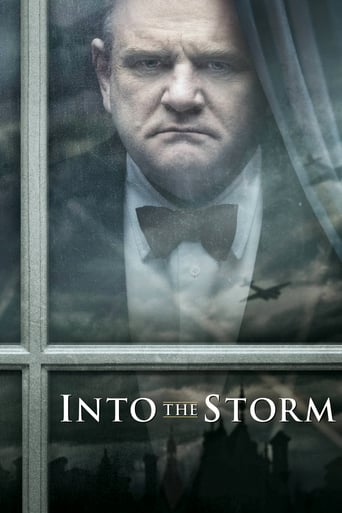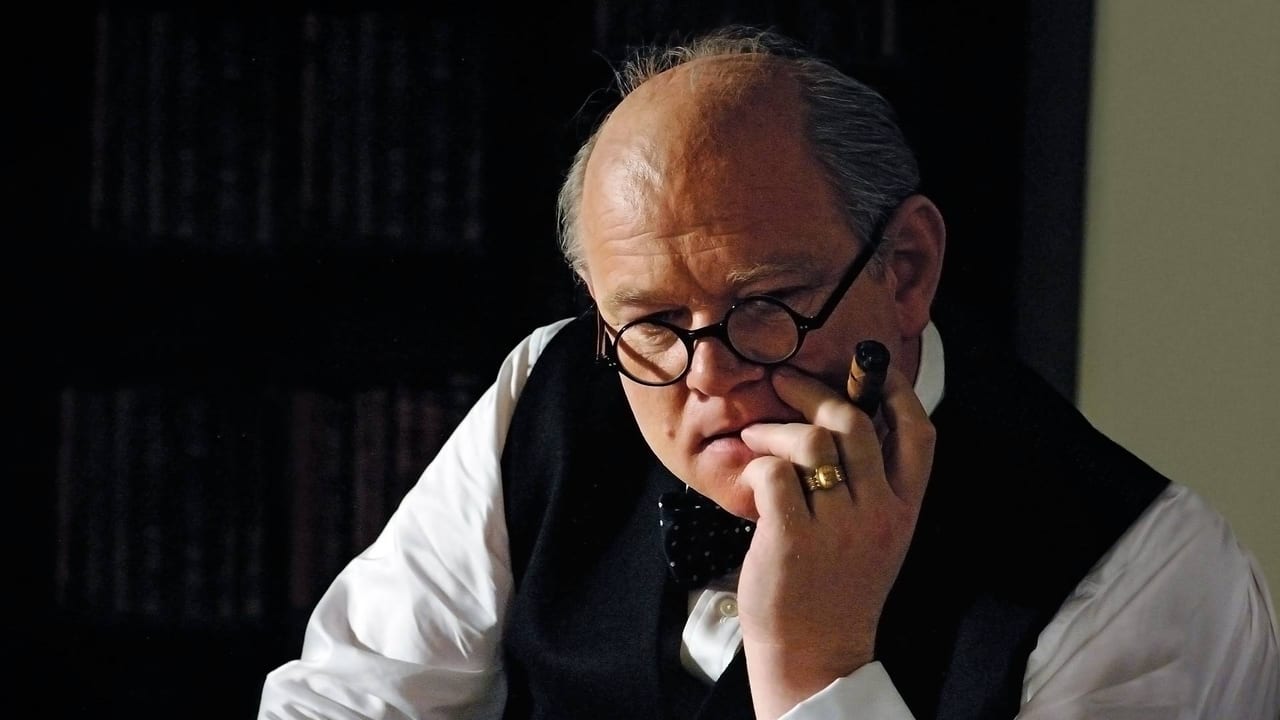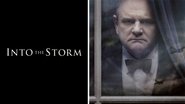Lee Eisenberg
Without a doubt, Winston Churchill's reputation got solidified by leading the United Kingdom through World War II and bringing about its greatest victory. Thaddeus O'Sullivan's "Into the Storm" focuses on Churchill's period as prime minister. As the PM, Brendan Gleeson (Mad-Eye Moody in the Harry Potter movies) puts his all into the role, as does Janet McTeer as his wife Clementine.Two scenes in particular stood out to me. One is when Churchill is meeting Roosevelt in the White House and has an awkward moment, forcing the PM to say "As you can see, I have nothing to conceal." A little instance of comic relief. The next is when the two of them have a summit with Stalin in Tehran's Soviet embassy. Churchill toasts the proletarians and Stalin toasts the Tories. This is undeniable evidence of the saying that politics makes strange bedfellows (in this case, the communist state and the western imperial powers saw a common enemy in Nazi Germany). I guess that it indirectly predicted Russia's current partnership with Iran.Anyway, it's a good movie. While the bulk of the credit should go to Gleeson - who won a well deserved Emmy for his performance - I'd say that McTeer deserves her fair share. She's a criminally underrated actress. Watch "Songcatcher" and "Albert Nobbs" and see if you disagree.I hope to see "The Gathering Storm" eventually.
Jazzist-H-Crisp
This film explores an intriguing question: why did the people of Britain vote Labour in 1945, rejecting the man who had been their champion throughout the War? That man, Winston Churchill, is the central figure of the film and we are presented with many sides of his character and with flashbacks to his work as Prime Minister from the outbreak of war in 1939.I was very impressed by this film. Brendan Gleeson is excellent as Churchill, as is Janet McTear as his wife, Clemmie. The whole film is very well cast and the settings and period detail are used to great effect. The script by Hugh Whitmore is very good, ranging from the quietly intimate (presenting the Churchills' marriage), to the humorous, to the grand rhetoric of his epic wartime speeches. Thaddeus O'Sullivan directs the film with great skill, at times moving the story forward with dramatic urgency, and at others bringing out the emotion of a scene skilfully and effectively. Even familiar speeches of Churchill's, which suffer from over-familiarity, come across with real power.Britain was lucky to have had Churchill in its hour of need. He faced up to what the Nazis and the Fascists were doing and could see where appeasement policies would end up. History proved him right. After the fall of France, when Britain faced the might of Hitler's Reich alone, the rhetoric of Churchill inspired the people and urged them to fight on, despite every set-back. It would have been so easy to give in and settle for whatever terms Hitler would have offered. We owe a huge debt to Churchill for his determination and his tenacity. It is to the credit of this film that we feel warmth and sympathy for the man and gratitude for the leader.I am glad to see that this film has won many awards. It certainly deserves them.
Dunroman
Somehow the Albert Finney film got deeper into the man, the image of Finney going for a pee was just so Churchill - with a complete lack of concern about anything else when he had an idea in his head (particularly a speech in the forming), including his own nudity. Finney also looked more physically like Churchill.Other reviewers have commented on the licence with history taken and this is a good point, but given that this man so centred his success on the spoken word, really there should have been greater use of his speeches to parliament or the repeats he subsequently made on the BBC. These speeches really were "tour-de-force" and the amount of effort that went into just one speech was truly incredible - perhaps a week or two of solid work - particularly his address to Congress.One element that pleased me particularly was the reporting of the ==Gestapo speech==. This caused real controversy at the time, and maybe contributed to his defeat in 1945.Perhaps the film makers used this speech as a device to highlight an apparently more unreasonable part of his nature (Churchill is still hated by some sections of the Left for his actions as Chancellor before and during the General Strike). So while it is valuable to show that he was a complex character, it reflected for me more other people's opinion of him rather than his real character as a man.Indeed, by contrast, some on the Right in Britain today see a real degree of prescience in what he said, in that the police forces which were widely supported by the middle classes in the 80s and 90s have, in the naughties (and particularly post 9/11) lost that support through just such heavy-handed support for a socialist government, chasing tractor production figures - just as Churchill envisaged - "no longer civil and no longer servants".Certainly in comparison with his other speeches the Gestapo speech was of minor importance and its impact in 1945 was probably very small (he was going to lose anyway) the film would have done better to concentrate on his other speeches - perhaps the Iron Curtain speech. Indeed there would have been better ways to show that in 45 he was out of touch with a nation tired of warIn all this, the Gleeson portrayal is still well worth watching and sheds light on the ability of a single man to shape history.BTW for those interested in learning more about this flawed but truly great man, you could do worse than to read Roy Jenkin's biography of Churchill - perhaps the best - and very readable.
jonathanruano
"Into the Storm" is one of those films where the lead actor Brendan Gleeson plays wartime Prime Minister Winston Churchill as though he is that man, but all that talent goes to waste because this film is nothing more than a white-wash of history. Evidentally the creators of this movie were more concerned about not offending anyone than with creating a film that was thought provocative, profound and even controversial. As a result, the plot and the characters simply go through the motions like in the propaganda war films from the 1940s. But you can also excuse the corny propaganda reels because they were a product of their own time. But one cannot excuse "Into the Storm" especially considering that it was made in 2009 when more primary documents about this period were available to the public.Indeed, in my humble view, this film would have been so much better if it remained faithful to the historical record instead of portraying the Second World War much in the same way as grandpa wanted to see it. The real Winston Churchill, for example, may have been a genius, but he had a very dark side which was completely overlooked in this movie. Churchill knew in April 1939 that Hitler would go to war to escape from the economic troubles that Germany was facing at that time. Moreover, Chamberlain and Roosevelt were in large part responsible for causing the Second World War. They worked together in implementing the Tripartite Stabilization Agreement, the Anglo-American Trade Agreement and other measures which had the effect of reducing German exports. Since the Germans could no longer earn foreign exchange (with which to buy foodstuffs and raw materials) by exporting goods abroad, Hitler faced a situation where he would either have to impose a tough austerity program that would have caused massive unemployment and starved his people or he would have to obtain his foodstuffs and raw materials through territorial conquest. He chose the latter course. But once again, "Into the Storm" makes no reference to that side of the story. If it did, then this movie would have been a lot more interesting.Finally, I object to the way Franklin D. Roosevelt was portrayed in this film by Len Cariou. Cariou seems to have got the impression that Roosevelt was a plain spoken honest man, when he was in fact the complete opposite. Roosevelt played mind games with his staff, his foreign allies and with his enemies. Moreover, he was the mastermind behind economic warfare against Germany. Once again, this film can take any approach to the material that it likes. But I submit that the reality of what happened is so much more interesting than any of the white-wash that this movie has to offer."Into the Storm" is not the worst movie I have seen. But it is pretty bad. It has no imagination, it does not have a whole lot of intelligence and the creators lack the independent mindedness to portray the past in a new and original way.



 AD
AD




